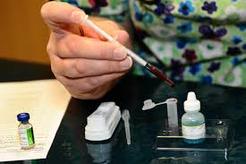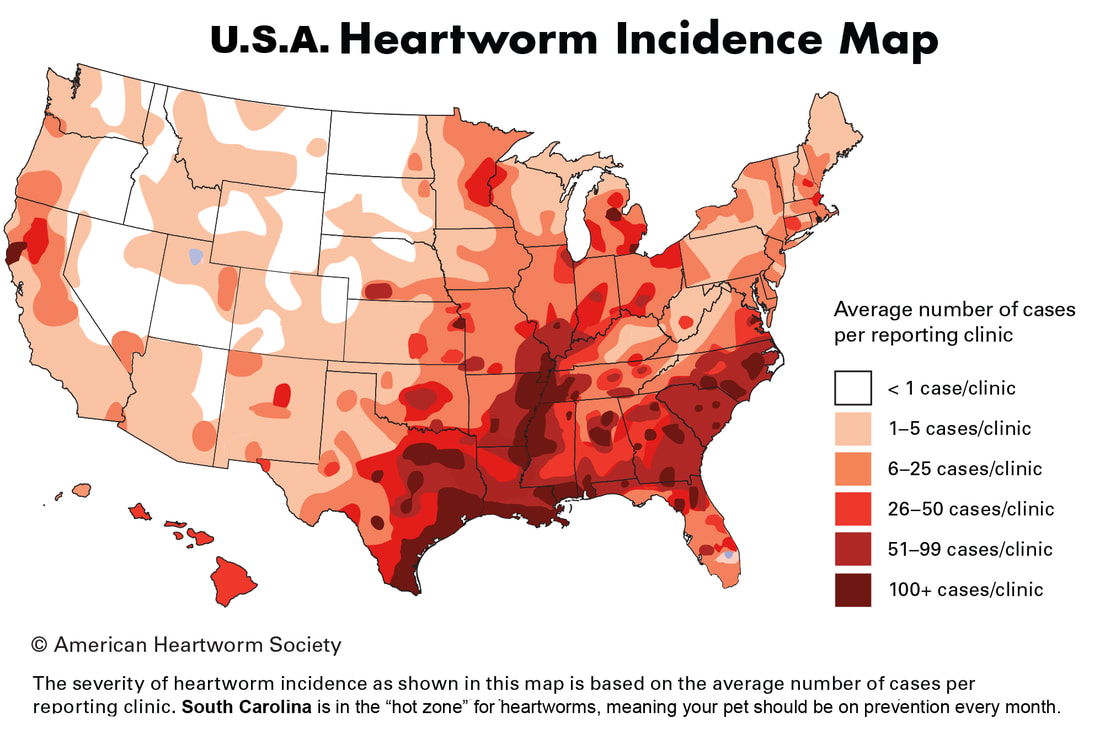|
Heartworm Disease is a serious and potentially fatal disease that affects pets in the Unites States and many other parts of the world. It is caused by heartworms that live in the heart, lungs and associated blood vessels of affected pets, causing severe lung disease, heart failure, and damage to other organs in the body. Heartworm disease affects dogs, cats, and ferrets; but heartworms also live in other mammal species, including wolves, coyotes, foxes, sealions and -in rare instances- humans. Because wild species such as foes and coyotes live in proximity to urban areas, they are considered important carriers of the disease. It takes 6 months from the time a pet was bitten by an infected musquitoe to test positive. This delay often leads pet owners into a false sense of security, which is why we recommend yearly testing along with year-round prevention. Signs of heartworms in dogsIn the early stages of the disease, many dogs show few symptoms or no symptoms at all. The longer the infection persists, the more likely symptoms will develop. Active dogs, dogs heavily infected with heartworms, or those with other health problems often show pronounced clinical signs. Signs of heartworm disease may include a mild persistent cough, reluctance to exercise, fatigue after moderate activity. decreased appetite. and weight loss. As heartworm disease progresses, pets may develop heart failure and the appearance of a swollen belly due to excess fluid int he abdomen. Dogs with large numbers of heartworms can develop sudden blockages of blood flow within the heart leading to a life-threatening form of cardiovascular collapse. This is called caval syndrome, and is marked by a sudden onset of labored breathing, pale gums, and dark bloody or coffee-colored urine. Without prompt surgical removal of the heartworm blockage, few dogs survive. Signs of heartworms in catsSigns of heartworm disease on cats can be very subtle or very dramatic. Symptoms may include coughing, asthma-like attacks, periodic vomiting, lack of appetite, or weight loss. Occasionally an affected cat may have difficulty walking, experience fainting or seizures, or suffer from fluid accumulation in the abdomen. Unfortunately, the first sign in some cases is sudden collapse of the cat, or sudden death. What if my pet tests positive?Dogs- No one wants to hear that their dog has heartworm, but the good news is that most infected dogs can be successfully treated. The goal is to first stabilize your dogs if he is showing signs of disease, then kill all adult and immature worms while keeping the side effects to a minimum. Cats- Like dogs, cats can be infected with heartworms. There are differences, however, in the nature of the disease and how it in diagnosed and managed. Because a cat is not an ideal host for heartworms, some infections resolve on their own, although these infections can leave cats with respiratory system damage. Heartworms in the circulatory system also affect the cat's immune system and cause symptoms such as coughing, wheezing, and difficulty breathing. Heartworms in cats may even migrate to other parts of the body, such as the brain, eye, and spinal cord. Severe complications such as blood clots in the lungs and lung inflammation can result when the adult worms die in the cat's body.  Testing for heartworm only requires 3 drops of blood, stool samples will not show heartworm disease as it is not an intestinal parasite but one that resides in the blood stream. I have missed 2 months of HW prevention, what do i do now?You need to consult your veterinarian, and immediately re-start your dog on monthly preventative-then retest your dog 6 months later. The reason for re-testing is that heartworms must be approximately 7 months old before the infection can be diagnosed. For more information on heartworm disease, check out the american heartworm society's website or talk to your veterinarian!
89 Comments
|
AuthorLauren Quinn Archives
March 2020
Categories |
We operate by appointment only, please contact us via phone or online to set up a time for you and your pet!
Business Hours:
Monday 9:00 AM-5:00 PM
Tuesday 9:00 AM-5:00 PM
Wednesday 9:00 AM-12:00 PM*
(no appointments)*
Thursday 9:00 AM-5:00 PM
Friday 9:00 AM-12:00 PM
Sat & Sun Closed
|
Tel: (260)424-1689
Fax:(260)424-0700 |
|
|
|
Site powered by Weebly. Managed by IDEXX Laboratories



 RSS Feed
RSS Feed
